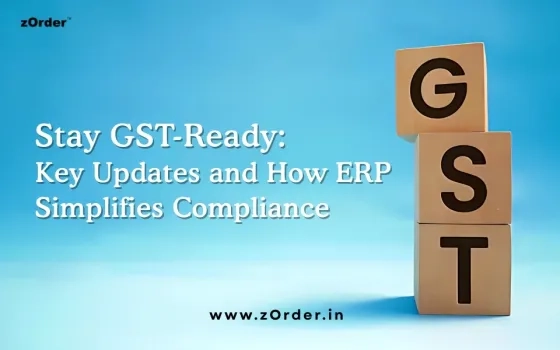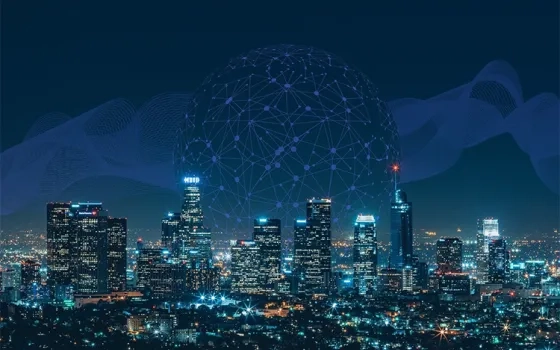The landscape of the Indian tax system has been evaluated and reformed from time to time. In this evolving journey, GST is the latest tax system, introduced in 2017. Over the past eight years, it has been adapting and transforming continuously. Staying up-to-date with its rules and regulations is essential for businesses to ensure continuity and compliance.
E-invoice and E-way bill are two main components of GST that streamline tax administration in India. E-invoices and e-way bills are designed to bridle fraud and establish transparency in taxes. GST was introduced with the goal of reducing tax evasion and creating a supportive environment for businesses to contribute to revenue growth. Additional mandates every year and frequent changes have led to confusion among business owners, and they often find challenges in their day-to-day operations related to GST.
In this context, let's try to understand e-invoices and e-way bills in simple words, the latest changes in GST, and how ERPs tackle GST-related issues and streamline tax compliance for businesses so that they can grow and flourish without worrying about GST complexities.
What Are E-Invoicing and E-Way Bills?
E-Invoicing
As per GST rules, every B2B invoice must be authenticated by the GST Invoice Registration Portal (IRP). Invoices uploaded to the GST portal get a unique Invoice Reference Number (IRN) and a QR code. This whole process is referred to as the e-invoicing system.
Who needs to generate e-invoices?
If you are into B2B business and your annual turnover is ₹5 crore or more, you must generate e-invoices as per the rules.
Why it matters:
- Reduces invoice mismatches and input tax credit (ITC) errors
- Speeds up invoice processing and reconciliation
- Minimizes manual data entry and potential fraud
- Keep the government informed about your sales
E-Way Bills
An E-Way Bill is a digital document required to be generated on the GST portal when you are transporting goods. It contains details like where the goods are going, who is sending them, and what the goods are.
Who needs to generate an e-way bill?
If you are transporting goods worth more than ₹50,000 from one place to another, whether by truck, car, or courier, within the state or interstate
Why it matters:
- Enables real-time tracking of goods
- Ensure tax compliance during movement
- Simplifies checks during goods transportation
- proves that the goods are genuine and tax-paid
Recent GST Updates you should know
Here are the most recent and impactful changes introduced by the GSTN and NIC that businesses must prepare for:
- Login security (MFA) will be mandatory
To enhance security and prevent misuse of login credentials on the NIC portal, from 1st January 2025, multi-factor authentication becomes mandatory for taxpayers with an Annual Aggregate Turnover (AATO) exceeding ₹20 Crore for generating e-invoices and e-way bills.
For taxpayers with an AATO exceeding ₹5 Crore, this mandate comes into effect from 1st February 2025.
By 1st April 2025, all taxpayers, regardless of their turnover, need to use MFA for secure access
# This means users will need to verify login using OTP, authenticator apps, or biometric-based options in addition to passwords.
- Limit on old bills for e-way bill generation
Starting from 1st January 2025, businesses cannot use very old bills to generate E-way bills, which can only be generated for documents dated within 180 days of the generation date.
Example: If your bill is dated 15 August 2024, you will not be able to generate an E-way bill for it after 11th February 2025 (that's 180 days later)
# This change will help to control backdated entries and their misuse.
- Limits on E-Way Bill Extension Periods
Earlier e-way bills can be extended multiple times. However, under the new rule, the maximum extension allowed is 360 days from the original date of generation. For example, an e-way bill generated on 5th January 2025 can be extended only until 30th December 2025.
# This will stop businesses from taking advantage of long validity periods when goods are being transported.
- Lower Turnover Threshold for E-Invoicing
According to the central tax GST notification No. 10/2023, the specific limits of e-invoicing have been decreased. All businesses that have an AATO of ₹5 crore or above must generate an e-invoice from the first day of August 2023. Earlier, businesses that have an AATO of ₹20 crore or more bonded to generate an e-invoice.
# After this notification, many businesses came under the roof of e-invoicing, especially small and mid-sized enterprises.
- Integration with Multiple Invoice Registration Portals (IRPs)
Sometimes, the GST portal may be slow or down, so the government now allows businesses to connect with multiple IRPs (e.g., IRP1, IRP2, IRP3, etc.) rather than depending on only one. If one IRP faces technical downtime, invoice generation can continue smoothly via an alternate IRP.
# This new update will help businesses avoid problems caused by system failure and ensure smooth business continuity.
Key Challenges Businesses Still Face in GST Compliance
Despite many updates, automation, and digitization, GST compliance is not without its pain points for business owners due to
- Confusion is created by frequent policy updates.
- Manual reconciliation of Input Tax Credit (ITC)
- Time-consuming process of e-invoice and e-waybill generation
- Error-prone filings that lead to penalties and missed deadlines
- Dependency on accounting teams for last-minute corrections
Makes GST Compliance Simple for Businesses
Managing GST compliance is not an easy task and can often feel stressful. Creating e-invoices, generating e-way bills, and checking tax data with updated rules need time, effort, and patience.
Here, businesses require robust and simple ERP software that makes their operations easy and hassle-free. The best ERP solutions are designed to ensure fast, easy, and error-free tax compliance.
Key Features of ERPs for Managing GST
- Easy E-Invoice Generation
- Create multiple e-invoices in just one click—no need to enter them manually
- It automatically generates the special IRN number and QR code required by the government.
- All e-invoices can now be saved, printed, and tracked anytime; no longer searching through multiple files.
- Quick E-Way Bill Generation
- ERPs are able to generate e-way bills without manually uploading invoices to the GST portal.
- Works directly with overall sales data, so you already have data to use for E-way bill generation without extra steps.
- Avoid transport delays and stay compliant with the latest GST rules for moving goods.
- GSTR 2B Reconciliation in Minutes
- The system will automatically reconcile the purchase records with inputs available on the GST portal by simply uploading the JSON file.
- Find any mismatches or mistakes instantly, and you can fix them before filing.
- Save not only hours of manual checking but also reduce errors and speed up your GST return process.
- Strong Security and High Reliability
- Compatible with the new MFA (Multi-Factor Authentication) rules starting in 2025.
- ERP can connect to multiple government Invoice Registration Portals (IRPs), so even if one is down, your work never stops.
- Can handle multiple GST numbers (multiple GSTINs) from a single account, suitable for businesses with many branches.
- Simple to Use
- The best ERPs have a clean and easy-to-understand design, you don’t need to be a tech or tax expert to use them.
- Not too much training is required; just a few hours of training, and you and your staff can start using it.
Benefits of Using ERP for GST
- Saves Time & Reduces Costs
- It automates routine tasks like creating e-invoices and e-way bills and checking purchase data, which reduces operational costs.
- It reduces mistakes and notifies errors, which means low chances of penalties
- ERP provides full Support for your business
- Help is always available on a call for solving your GST queries.
- They give you guidance and the latest updates to keep your GST compliance always correct.
- Fully Integrated with ERP
- Works directly with software solutions; no need for extra setup for GST compliance.
- Automatically checks your data for accuracy before sending it to the GST portal.
- Always Up-to-Date and Scalable
- They update regularly according to the latest GST rules and regulations
- Whether you are running a small shop or a multi-location retail chain, ERP handles all your tax compliance.
Stay Ahead with the latest solution providers
By each passing year, the GST system is moving towards deeper digitization and tighter controls. While this improves transparency and control, businesses must adopt proactive systems to stay ahead. With frequent GST rule changes, like MFA security, document date limits, and expanded e-invoicing requirements, having the ERP is a necessity, not a luxury.
Modern ERPs are designed to simplify every step, helping you stay with rules, avoid mistakes, and save your valuable time. Whether it’s creating e-invoicing, generating e-way bills, reconciliation, or filing, everything becomes easier and faster with ERP, so you can focus on growing your business instead of worrying about tax paperwork.













